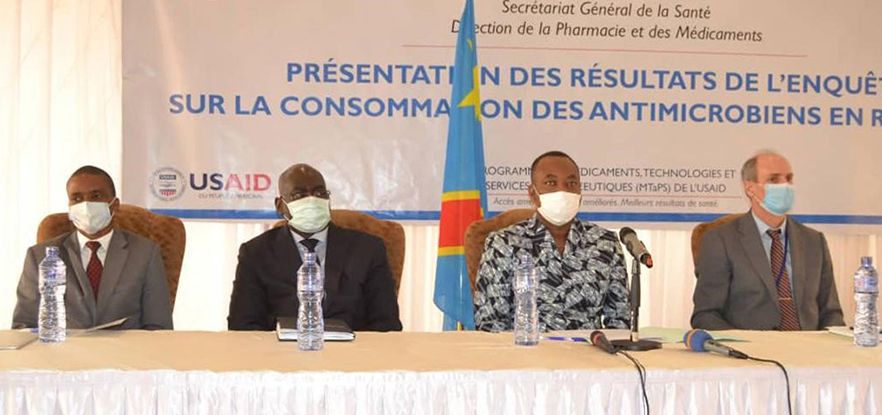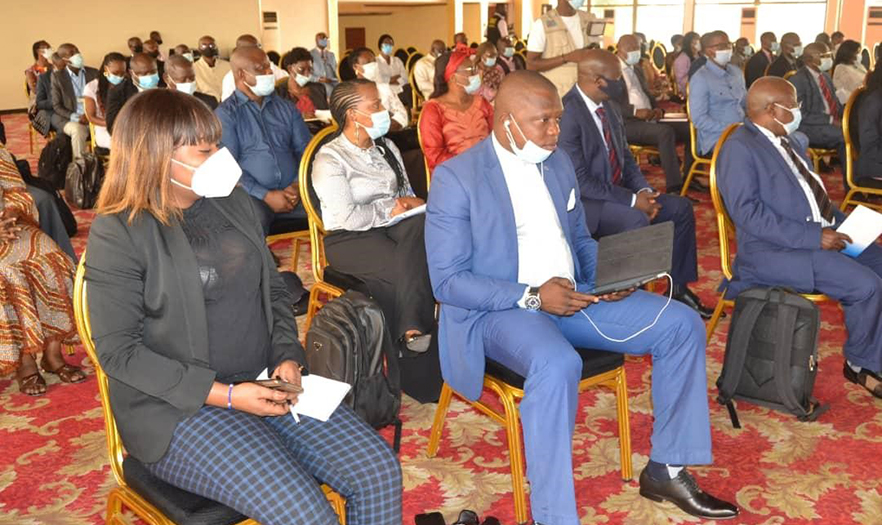DRC completes its first national survey on antimicrobial consumption
“Antibiotic resistance (AMR) has dramatically increased these past years throughout the world. It is now considered one of the biggest and most pressing threats for global public health. For this reason, and based on the World Health Assembly’s resolution [on antimicrobial resistance (AMR)], the Democratic Republic of Congo (DRC) has developed a national plan against antimicrobial resistance.”
These are the words that Dr. Eteni Longondo, Minister of Health for DRC, used to highlight the dangers of AMR on December 4, 2020, during a presentation of the results of a survey on antimicrobial consumption in DRC (source: National Congolese Radio and Television (RTNC)).

The presentation of the survey results on December 4, 2020. Left to right: The Director of the DPM, the WHO Representative for DRC, the Minister of Health, and the USAID Health Office Director for DRC. Photo credit: Junior Kiama/USAID MTaPS
AMR decreases the effectiveness of antimicrobials and impacts not just the human sector, but also the animal, environmental, and agricultural sectors. This threat is even more challenging in low- and middle-income countries due to various constraints, including the availability of funding, and lack of data to deal with the issue.
As part of AMR containment efforts, DRC prioritized the implementation of a national action plan to monitor the consumption of antimicrobials and improve their use. A survey tool was created to obtain this consumption data and then use that data to raise awareness of AMR and inform the actions of health professionals, clients, and political leaders.
The USAID Medicines, Technologies, and Pharmaceutical Services (MTaPS) Program worked with the Directorate for Pharmacy and Medicines (DPM), in collaboration with WHO, to help conduct the survey. They collaborated to train surveyors and supervisors on the survey’s methodology. This work included mastering the Anatomical Therapeutic Chemical/Daily Defined Dose (ATC/DDD) classification, antimicrobial surveillance, and data collection.
The survey started in August 2020 and lasted for two months. It was carried out in Haut-Katanga, Kinshasa, and Nord-Kivu, the three provinces that are principal entry points for imported medicines, and that host the manufacturing sites for locally produced medicines. Due to challenges in collecting accurate data, the survey only included antimicrobials that were distributed between 2018 and 2019 in private sector wholesale facilities, regional medicines distribution centers, local medicine production industries, UN agencies, and international and local NGOs.
The survey showed a number of positive indicators. Using WHO’s AWaRE (Access, Watch, and Reserve) classification, a tool designed to support antimicrobial stewardship, the survey revealed that antibiotics in the Access category—the category offering the best therapeutic value while minimizing the potential for resistance—represented 71% of the total number of antimicrobials in 2018 and 70% in 2019, well above the WHO’s recommendation of at least 60%. Keeping the use of Access group medicines above 60% for the treatment of infectious diseases helps promote the rational use of antimicrobials, as Watch and Reserve groups are reserved for special cases in which Access group antibiotics don’t work or can’t be used.

Participants during the presentation of the survey results on December 4, 2020. Photo credit: Junior Kiama
The data collected on antimicrobial consumption has enabled DRC to join WHO’s GLASS platform—a step that will help the country increase its capacity level as per WHO’s framework, while also supporting global surveillance efforts.
“We wanted to know what was the quantity of antimicrobials that are used in the country. We want last resort antibiotics to be protected. With AMR, if there isn’t any protection for antibiotics and that there is an overconsumption, we’ll be in a situation of complete resistance.” – Dr. Donatien Kabamb Kabey, Director of the DPM, in an interview with the RTNC during the presentation of the survey results
MTaPS will continue to support the DPM to ensure that the survey is conducted annually, following WHO recommendations, to help identify a trend of antimicrobial use in DRC. With this trend and quantitative analysis, the country will be able to determine the areas that need attention for specific corrective measures. Additionally, MTaPS will provide its expertise to help implement the AMR action plan for better antimicrobial stewardship.